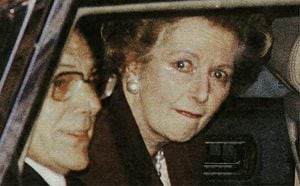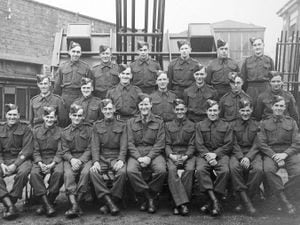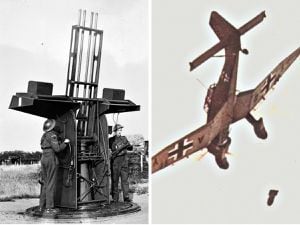How Maggie's downfall changed the course of history
She put on a brave face, but deep down Margaret Thatcher must have known that the end was in sight.

Enoch Powell famously said that all political careers ended in failure, and not even the Iron Lady could defy the laws of gravity.
But as the mistress of political theatre, it was inevitable that the 20th century's longest-serving prime minister would exit the stage with a bang.
It is 30 years ago today that Margaret Thatcher stepped out of the British embassy in Paris to respond to the bombshell news that the she had not received enough votes to see off Michael Heseltine's challenge to her leadership. While she had secured 55 per cent of the vote compared to Heseltine's 41 per cent, the Conservative Party's rather Byzantine rules at the time deemed the lead too narrow – it was four votes short of the required 15 per cent majority. She might technically have won the first skirmish, but her authority was now holed below the water line.
As the PM made her way towards the assembled media, the BBC's political reporter John Sargeant famously attempted to block her path, thrusting his microphone under her nose. Clearly irritated by what she perceived as Sargeant's bad manners, the prime minister unceremoniously pushed the BBC man out of the way as she continued to walk towards the microphone which had been set up for her.
Mrs Thatcher defiantly told waiting reporters that she was pleased to have secured the majority the votes cast, but disappointed not to have secured 'quite enough' to avoid another vote. She said she would be contesting the second ballot, where a simple majority would have been enough. Three days later, she announced her resignation.
By autumn 1990, Mrs Thatcher's popularity had been on the wane for some months. The controversial community charge, or 'poll tax' as it was described by opponents, was proving unpopular, even leading to riots in the street. But it was Mrs Thatcher's opposition to a single European currency which was alienating her from colleagues in cabinet. Her deputy, Sir Geoffrey Howe, had resigned from his post a year earlier, delivering a withering speech in which he likened her policy on Europe to "sending your opening batsmen to the crease, only for them to find, as the first balls are being bowled, that their bats have been broken before the game by the team captain".
Michael Heseltine, a long-time opponent of Mrs Thatcher, had made little secret of his ambitions since his resignation from the cabinet in 1986, and decided in November, 1990, that it was time to pounce. But the man the media dubbed Tarzan after he swung the Commons' mace above his head during a heated debate in 1976 would not achieve his lifelong aim of entering No. 10. Instead the crown went to 47-year-old John Major who, just 13 months after being appointed chancellor, became the youngest prime minister since Lord Rosebery.
While Thatcher had backed Major in the leadership election, it soon became very clear that he would be a very different prime minister to his predecessor. He appointed Heseltine as environment secretary, and immediately gave him the brief or replacing the community charge with the less contentious council tax, which was effectively a reform of the old rates system. But it was Major's policy on Europe which would differentiate him most from Thatcher. For the Conservatives, the change paid off, at least in the short term. Major's working-class background and talk of creating a classless society struck a chord with many of the voters who had supported Thatcher, and his more conciliatory approach towards the ambitions of EEC leader Jacques Delors appeared to have healed the rift which grew towards the end of the Thatcher era. And having trailed Labour in the polls by 14 points during the last week's of Mrs Thatcher's leadership, under Major the Tories found themselves leading in the polls. Seventeen months later, Major had led the Conservatives to a fourth consecutive general election victory, something that seemed inconceivable in Thatcher's last days.
The honeymoon was brief. Black Wednesday, which saw Britain ejected from the European Exchange Rate Mechanism (ERM), laid bare the difficulties of a single European currency, while Major's support for closer integration with other EEC members saw the fragile truce quickly blown apart.
While events of the past few years have shown the futility of trying to predict the future, there is no doubt that if Margaret Thatcher had secured just four more votes on November 20, 1990, then the course of history would have been very different.
Had Mrs Thatcher continued as PM, and led the party into the 1992 General Election, the opinion polls suggested there was a very real chance that she would have lost, and it would have been Neil Kinnock, and not Tony Blair who would have ended Labour's period in the wilderness. The New Labour revolution of the late 1990s – and possibly even the Corbyn backlash – may never have happened.
On the other hand, had Mrs Thatcher snatched an unlikely win in 1992, it seems doubtful she would have signed the Maastricht Treaty, which replaced the old trading bloc of the EEC with what would become the European Union. It was this treaty which led to the formation of the UK Independence Party, the rise in eurosceptic sentiment across Britain, and ultimately Britain's decision to leave the EU.
The Iron Lady's brusque handling of John Sargeant also led to the then little-known reporter becoming something of a minor celebrity.
He later said his faux-pas had launched his career just as Mrs Thatcher's was coming to an end.
"I have a great deal to thank Margaret Thatcher for, she made my career," he said. "You can work in television news for a long time, night after night, and somehow the public are totally unmoved by your presence. Something needs to happen to bring you to their attention, and in my case that involved making a big mistake in front of a very large audience."
So, were it not for the events on the evening of November 20, 1990, there may well have been no New Labour, no Brexit referendum, and probably no John Sargeant on Strictly Come Dancing. I'll leave it to you to decide whether that would be a good thing or not.





